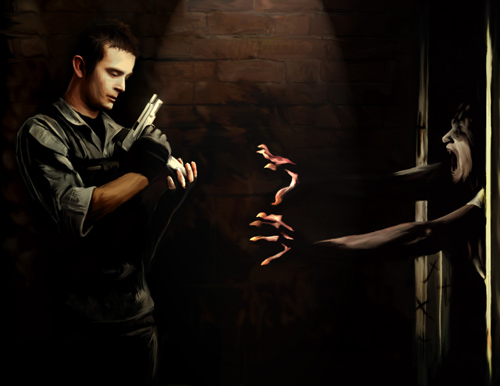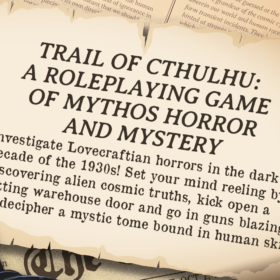See Page XX
To Choose is to Surrender Choice
by Robin D Laws
In the adventure genre, we expect characters to flirt with consequence, but then to stage a hair’s-breadth escape. Drama, on the other hand, leads its protagonists inexorably to the results of their actions. Were Romeo and Juliet to miraculously recover from their respective suicide attempts, we would leave the theater scratching our heads, glad for them perhaps, but nonetheless wondering what all the fuss was about.
 Dramatic characters retain control of their destinies until they activate them, by making crucial decisions they can’t take back. Then the narrative machinery kicks into place, carrying them toward inevitable realization. A current screenwriting practice treats these major turning points as act breaks. Standard structure calls for three acts, so this theory calls for two key, irrevocable decisions, one about twenty-five minutes from the beginning and the other about twenty-five minutes from the end.
Dramatic characters retain control of their destinies until they activate them, by making crucial decisions they can’t take back. Then the narrative machinery kicks into place, carrying them toward inevitable realization. A current screenwriting practice treats these major turning points as act breaks. Standard structure calls for three acts, so this theory calls for two key, irrevocable decisions, one about twenty-five minutes from the beginning and the other about twenty-five minutes from the end.
This idea contravenes a central roleplaying assumption, that players must retain control and freedom of action for their characters at all times. In drama, freedom of action is punctuated—it remains available until it is invoked in a big way, after which point the character is indeed placed on a track to turning point or ultimate reckoning. Translated into game terms, freedom of a choice is a resource you spend and, at least for a time, do not get back. You have it, until you don’t.
How much can our emotional desire as roleplayers to retain constant freedom co-exist with the dramatic requirement of punctuated freedom? Those of us who have completely internalized the credo of complete freedom at all times might weave a dramatically airtight story arc for a character that everyone else at the table finds compelling and apt, and that they find disappointing, because executing it means surrendering control.
A common and dysfunctional player mannerism exploits this dichotomy. We’ve all gamed with players who habitually test the limits of the world by gratuitously starting trouble they shouldn’t be able to walk away from. The character hauls off and punches an NPC established as a psychopathic bad-ass. Or commits a heinous crime in public with no attempt to cover his tracks. Or strolls in without preparation to the magical land no man may ever leave.
They do this relying on the social conventions of roleplaying games—that characters retain total freedom at all time, and that the GM is there primarily to facilitate fun—to trump narrative logic. In a dramatic narrative, we expect certain choices to provoke inevitable consequences. The psychopathic crime boss sends his boys around to rub you out, and they do. The cops show up to arrest you for your heinous crime, and they do. You’re stuck in the magical land of Zar forever, the end.
 Players making a habit of this seek the thrill of transgression, but only when the risk is false. They’re counting on theGM or system to bail them an out, plausibility be damned. They expect not only agency, but immunity from the consequences of its exercise. Inevitable results seem especially unfair to them when the decision occurs in one scene and the resolution in another.
Players making a habit of this seek the thrill of transgression, but only when the risk is false. They’re counting on theGM or system to bail them an out, plausibility be damned. They expect not only agency, but immunity from the consequences of its exercise. Inevitable results seem especially unfair to them when the decision occurs in one scene and the resolution in another.
The answer, “Your fate was sealed the moment you loudly discussed your arson plans,” plays as unjust to them because they reject the idea that PCs have a fate—even when they’re the ones who set it in motion.
This is dysfunctional not only because it damages story credibility, but because it steals focus from other players. It yanks the story from a collective journey into one where the other characters either also face the trouble caused by the heedless PC, or get sidelined into observer status while the shitstorm plays out.
Here the old-schoolers retain the ancient wisdom others have forgotten. They don’t expect the DM to cater to chronic limits-testers. They expect them to squish them. You do something stupid, you get killed. New character sheet, move along, nothing to see here.
If only the “getting killed for doing something stupid” credo didn’t lead to other problems, like players going into a group fetal crouch for fear of inadvertently doing something stupid, we could re-assimilate this approach wholesale and be done for the day.
In groups where the constant agency model has metastasized into a get-out-of-consequences free card, you might push back with a technique I’ll call Foreshadowed Inevitability. As the character hauls back to punch the king in the face, you as GM say:
“If you do that, your character will probably be killed in an upcoming scene. Is that what you want?”
This retains the player’s freedom of choice, but also makes clear its limits. What should be clear to the player is made explicit: make this choice now, and your character goes on tracks. Tracks that you, not the GM or system, installed.
If there’s wiggle room between “probably” and “definitely”, the onus is now on the player to create it. The GM’s initial warning has already discharged her bacon-saving responsibilities in full.


